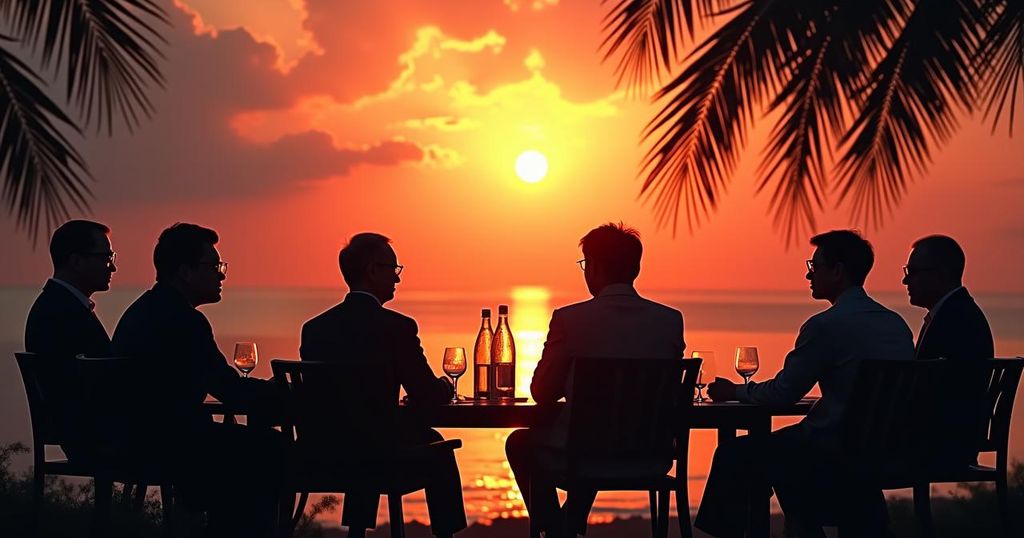Southeast Asian leaders convened in Laos for an ASEAN summit focused on the Myanmar civil war and South China Sea disputes, with discussions involving global powers like the U.S. and China. Key issues include Myanmar’s impending elections and regional tensions with China’s territorial claims, amidst concerns over ASEAN’s effectiveness and unity in addressing these challenges.
Southeast Asian leaders convened in Vientiane, Laos, to address pressing regional issues at the annual ASEAN summit. The agenda prominently featured the ongoing civil war in Myanmar, which saw an elected government ousted by the military in 2021, and territorial disputes in the South China Sea, where tensions continue to escalate amid overlapping claims from several ASEAN members and China. The summit will include discussions with global powers such as the United States, China, and Russia, highlighting the strategic interests at play in Southeast Asia. The presence of new leaders such as Thailand’s 38-year-old Prime Minister Paetongtarn Shinawatra, and Singapore’s Lawrence Wong, who took office recently, indicates potential shifts in leadership dynamics within the bloc. Lao Prime Minister Sonexay Siphandone opened the event by emphasizing the importance of cooperation within ASEAN. Notably absent is Indonesian President Joko Widodo, with Vice President Ma’ruf Amin representing Indonesia instead, reflecting an ongoing transition of power in the region. The summit is an opportunity for member states to discuss not only bilateral relations but also broader issues like economic development, climate change, and energy. However, the conflicting interests among ASEAN nations complicate collective action in response to China’s assertiveness in the South China Sea. U.S. Secretary of State Antony Blinken is expected to emphasize the deteriorating U.S.-China relations, particularly concerning China’s coercive actions in the maritime region. He will advocate for ASEAN to sustain pressure on Myanmar’s military government regarding its unrepresentative plans for future elections, as there has been a lack of progress on the bloc’s peace plan since the military coup occurred. The ongoing conflicts in Myanmar and the South China Sea have tested the credibility and unity of ASEAN, as well as its ability to mediate effectively. While an informal consultation on Myanmar will take place in December, the anticipated presence of Myanmar’s officials may signal ASEAN’s compromise on its response strategy to the crisis. Experts suggest that the likelihood of achieving substantive outcomes remains low, as regional priorities often override collective interests.
The Association of Southeast Asian Nations (ASEAN) is an intergovernmental organization comprising ten Southeast Asian nations, established to promote political and economic cooperation and regional stability. The current geopolitical landscape poses significant challenges to ASEAN, particularly with the civil war in Myanmar resulting from a military coup in 2021, which has led to ongoing violence and instability. Additionally, the South China Sea has become a flashpoint for confrontations involving China’s territorial claims and the rights of other nations, including Vietnam, the Philippines, Malaysia, and Brunei, which complicates ASEAN’s unified stance. The ongoing tensions, paired with the geopolitical rivalry between the U.S. and China, highlight the necessity for ASEAN to navigate its relationships both regionally and internationally, while maintaining its credibility and promoting peace.
In conclusion, the ASEAN summit in Laos serves as a critical platform for Southeast Asian leaders to address the pressing issues of the Myanmar civil war and South China Sea disputes amidst growing global tensions. The involvement of major powers further underscores the importance of the region in international affairs. However, ASEAN faces significant challenges in achieving cohesive responses due to the diverse interests of its member states, raising concerns about its effectiveness in promoting regional stability and genuine cooperation. The future of ASEAN’s influence will hinge on the collective ability to resolve these conflicts while adapting to changing leadership dynamics and external pressures.
Original Source: kdhnews.com






